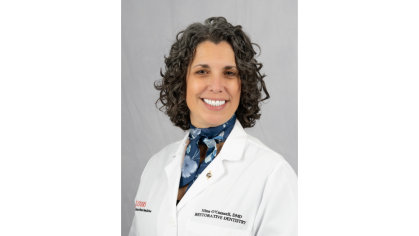Advocating for Oral Health from Root Canals to Capitol Halls
Endodontist Brandon Barnett was set to focus his health law project at Yale School of Public Health on access to care through Medicaid. Then water fluoridation stole the spotlight.

As a master’s student, Barnett dove deep into the topic, drafting a comprehensive analysis that caught the attention of faculty, who encouraged him to submit it to the Connecticut Senate and to Saud Anwar, Chair of the Public Health Committee. Around the same time, Barnett began collaborating with the Connecticut Oral Health Initiative (COHI), a nonprofit promoting affordable, quality oral healthcare, including water fluoridation. When Senator Anwar introduced a bill to codify the state’s fluoridation limit, Barnett testified on COHI’s behalf about the importance of this legislation. His voice helped shape the conversation, and the bill was signed into law in June.
“Dr. Barnett brought both expertise and heart to our advocacy,” said COHI’s Policy and Advocacy Director Sandra Ferreira. “He immersed himself fully, testifying at public hearings, engaging at the legislative breakfast, and contributing at every event. His presence elevated our work, and it was truly inspiring to witness his passion and commitment to advancing oral health for all."
Barnett earned his public health master’s, but his work continues.
He discovered his passion for public health while pursuing his endodontic residency at Rutgers School of Dental Medicine (RSDM). “Working in Rutgers and residency was fantastic. There was no shortage of people that needed care, and I would hear all the time about how they were looking and searching for dentists to do their root canals,” he said, “and then Rutgers would be the one place where they could get it.”

That experience solidified his belief that dentistry carries dual responsibility for treating disease and for prevention. Public health, he realized, was a way to do both, and he enrolled at Yale following his residency.
“I saw the need for the people in decision-making roles influencing policy to actually be dentists to articulate the oral health needs of the patient properly and really advocate for them,” he said.
Today, with fluoride success under his belt, Barnett is pushing for broader reforms. He’s advocating for root canals to be classified as medically necessary—especially for patients with diabetes or heart conditions—and for increasing Medicaid reimbursement rates because, he explained, many community health centers in Connecticut report financial losses on dental procedures, threatening their ability to serve vulnerable populations in the long run.
He encourages other dentists to join public policy efforts to become the voice of issues that they care about.
“Anyone can sign up to testify,” he emphasized. Hearings are listed publicly on government websites. “When you go in that room and testify, … you may often be the only dentist there, so everyone listens very intently, and they normally have no one to turn to when they have questions. And they're talking about a law that relates to your profession.”



